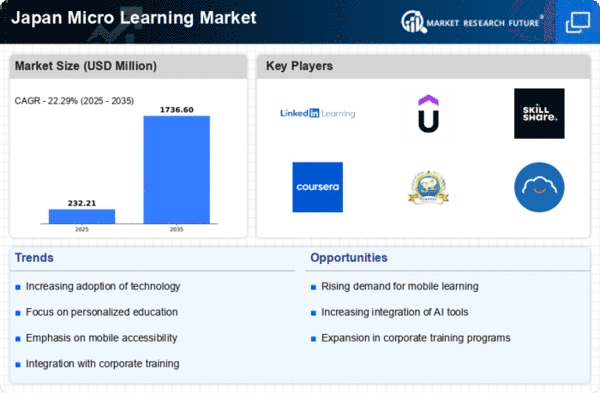Growing Popularity of Remote Work
The shift towards remote work has a profound impact on the micro learning market in Japan. As more companies adopt flexible work arrangements, the need for effective online training solutions has become increasingly apparent. In 2025, it is projected that remote work will account for over 30% of the workforce in Japan, necessitating innovative learning approaches. The micro learning market is well-suited to meet this demand, as it offers concise, easily digestible content that can be accessed from anywhere. This adaptability not only supports remote employees but also enhances their learning experience by allowing them to engage with training materials at their own pace. Consequently, the micro learning market is likely to expand as organizations seek to equip their remote workforce with the necessary skills and knowledge.
Focus on Compliance and Regulatory Training
Compliance and regulatory training is becoming increasingly critical within the micro learning market in Japan. As industries face stringent regulations, organizations must ensure that their employees are well-informed about compliance requirements. In 2025, it is estimated that compliance training will constitute approximately 40% of all corporate training initiatives in Japan. The micro learning market is particularly effective in delivering this type of training, as it allows for the dissemination of essential information in a concise format. By utilizing micro learning modules, companies can ensure that employees receive timely updates on regulatory changes, thereby minimizing risks associated with non-compliance. This focus on compliance training not only enhances organizational accountability but also drives the growth of the micro learning market as businesses seek efficient solutions to meet their training needs.
Emphasis on Employee Retention and Engagement
In Japan, the micro learning market is significantly influenced by the emphasis on employee retention and engagement. Organizations are increasingly recognizing that investing in employee development is crucial for maintaining a motivated workforce. A recent study indicates that companies that implement micro learning strategies report a 25% increase in employee engagement levels. This trend suggests that the micro learning market is becoming an essential tool for organizations aiming to foster a culture of learning and growth. By providing bite-sized, relevant content, companies can address specific skill gaps and enhance job satisfaction. Furthermore, as the labor market becomes more competitive, organizations are likely to leverage micro learning as a strategic advantage to attract and retain top talent, thereby driving growth in the micro learning market.
Rising Demand for Flexible Learning Solutions
The micro learning market in Japan experiences a notable surge in demand for flexible learning solutions. As organizations increasingly prioritize employee development, the need for training that accommodates diverse schedules becomes paramount. This trend is reflected in a 2025 survey indicating that 68% of companies in Japan are adopting micro learning strategies to enhance workforce skills. The micro learning market is thus positioned to benefit from this shift, as it allows learners to engage with content at their convenience, fostering a culture of continuous learning. Furthermore, the integration of mobile technology facilitates access to micro learning modules, enabling employees to learn on-the-go. This flexibility not only enhances knowledge retention but also aligns with the fast-paced nature of modern work environments, making it a critical driver for the micro learning market in Japan.
Technological Advancements in Learning Platforms
Technological advancements play a pivotal role in shaping the micro learning market in Japan. The proliferation of sophisticated learning management systems (LMS) and mobile applications has transformed how educational content is delivered. In 2025, it is estimated that the market for LMS in Japan will reach approximately $1.2 billion, indicating a robust growth trajectory. These platforms enable organizations to create, distribute, and track micro learning content efficiently. The micro learning market benefits from features such as analytics, which provide insights into learner engagement and performance. Additionally, the incorporation of artificial intelligence (AI) into these platforms allows for personalized learning experiences, catering to individual learner needs. As technology continues to evolve, the micro learning market is likely to see further innovations that enhance the effectiveness and accessibility of learning solutions.
















